Index relies entirely on the support of donors and readers to do its work.
Help us keep amplifying censored voices today.

Nabeel Rajab, BCHR – winner of Bindmans Award for Advocacy at the Index Freedom of Expression Awards 2012 with then-Chair of the Index on Censorship board of trustees Jonathan Dimbleby
On Thursday 6 October, Index on Censorship gathered outside the UK’s Foreign and Commonwealth Office with English Pen and the Bahrain Institute for Rights and Democracy to hold a vigil for imprisoned Bahraini human rights advocate, Nabeel Rajab.
The 2012 Index on Censorship award-winning Rajab has been in prison since 13 June of this year for comments he made on Twitter. These included details of the torture allegations at Bahrain’s Jau prison and criticisms of the Saudi war in Yemen.
Rajab faces up to 15 years in prison for “denigrating government institutions” and “publishing and broadcasting false news that undermines the prestige of the state”.
Protesting outside @foreignoffice to ask UK to call for release of @NABEELRAJAB #FreeNabeel pic.twitter.com/GrywaOncZe
— Jodie Ginsberg (@jodieginsberg) October 6, 2016
Originally Rajab’s sentencing was set for 6 October but has recently been postponed until 31 October. Since 25 September, Rajab has been held in solitary confinement in the East Riffa Police Station despite his health problems and the deplorable conditions.
The protest took place outside the FCO because although it has voiced “concern” over the re-arrest of Rajab it has not called for his release. At the Human Rights Council in Geneva, the UK stated that while it is “concerned” by recent human rights violations in Bahrain, it will continue to provide technical assistance to Bahrain.
It was recently announced that Prince Charles is to visit Bahrain in November. This followed Queen Elizabeth’s sitting beside the king of Bahrain this past spring for her 90th birthday.
While Rajab’s fate is still unknown considering the postponement of the trial until 31 October, the support for Rajab cannot cease. Bahrain has a long history of targeting Rajab in his human rights pursuits, and the UK cannot allow this to continue.
No one should be jailed for a tweet. Retweet to call on @moi_bahrain to free @NabeelRajab! #FreeNabeel pic.twitter.com/yuqVMIcEEg
— AmnestyInternational (@amnesty) October 5, 2016
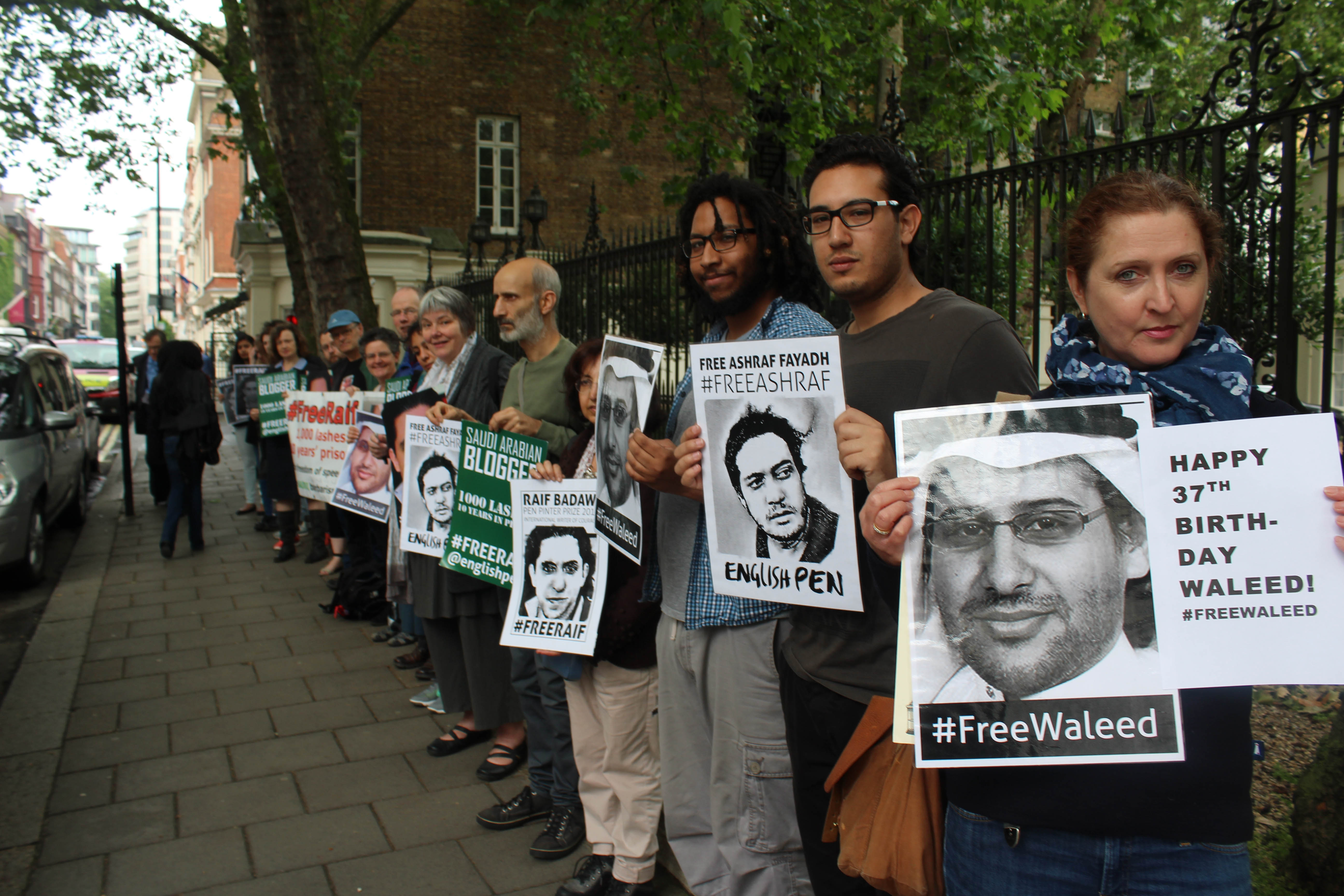
Credit: Cat Lucas, English PEN
Index on Censorship joined English Pen and several other organisations on Friday outside the Saudi Arabian embassy in London to call for the immediate release of Raif Badawi. The Saudi blogger was arrested four years ago on 17 June 2012. He was subsequently sentenced to 10 years in prison and 1,000 lashes for creating the website Free Saudi Liberals and “insulting Islam through electronic channels”.
Badawi received his first 50 lashes in the port city of Jeddah on Friday 9 January, after which the world took notice. The attention has been invaluable in delaying the remainder of his lashing, which his wife Ensaf Haidar says he won’t be able to survive.
Ahead of the demonstration, English Pen and the Raif Badawi Foundation for Freedom have been asking his supporters around the world to take action, including sharing a photo of themselves holding a poster of Raif or a message of solidarity.
It is crucial that we continue to take a stand against the Saudi government’s treatment of Raif Badawi. Index spoke with several of the protesters in London.
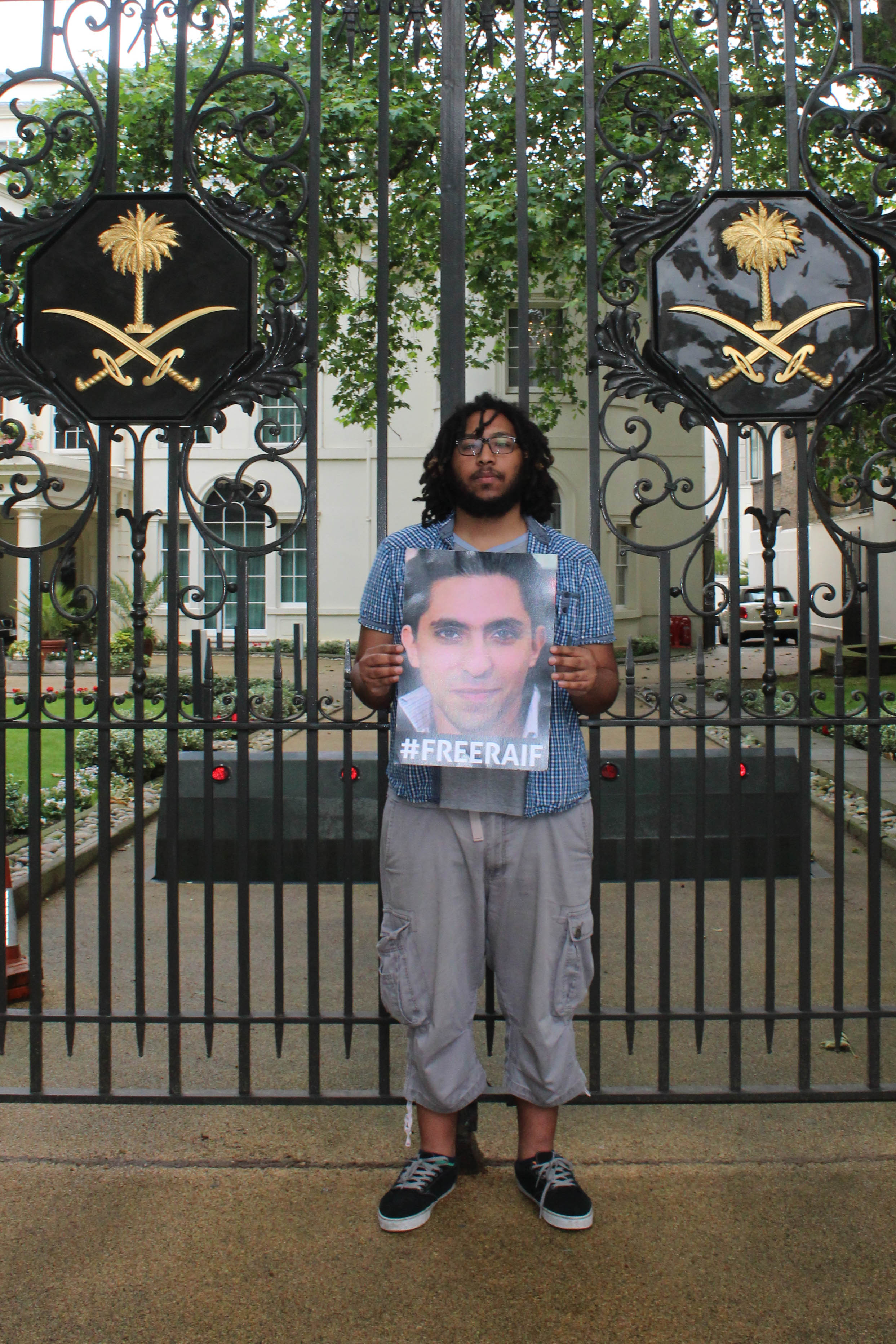
Credit: Cat Lucas, English Pen
Imad Iddine Habib, spokesperson of the Council of Ex-Muslims of Britain
“I come from Western Sahara and I’m here today because I knew Raif Badawi through his writings, have been to his websites and I know his family. This campaign is very close to my heart. Raif is in prison for writing and offering a space for a lot of Saudis that don’t fall in line with the thinking of the regime and the conservatives. I would hope to see more and more people stepping up to call out Saudi Arabia and the oppressive and anti-human rights laws they are implementing. Increasingly these laws are used against atheists and free thinkers, who are being judged as terrorists.”
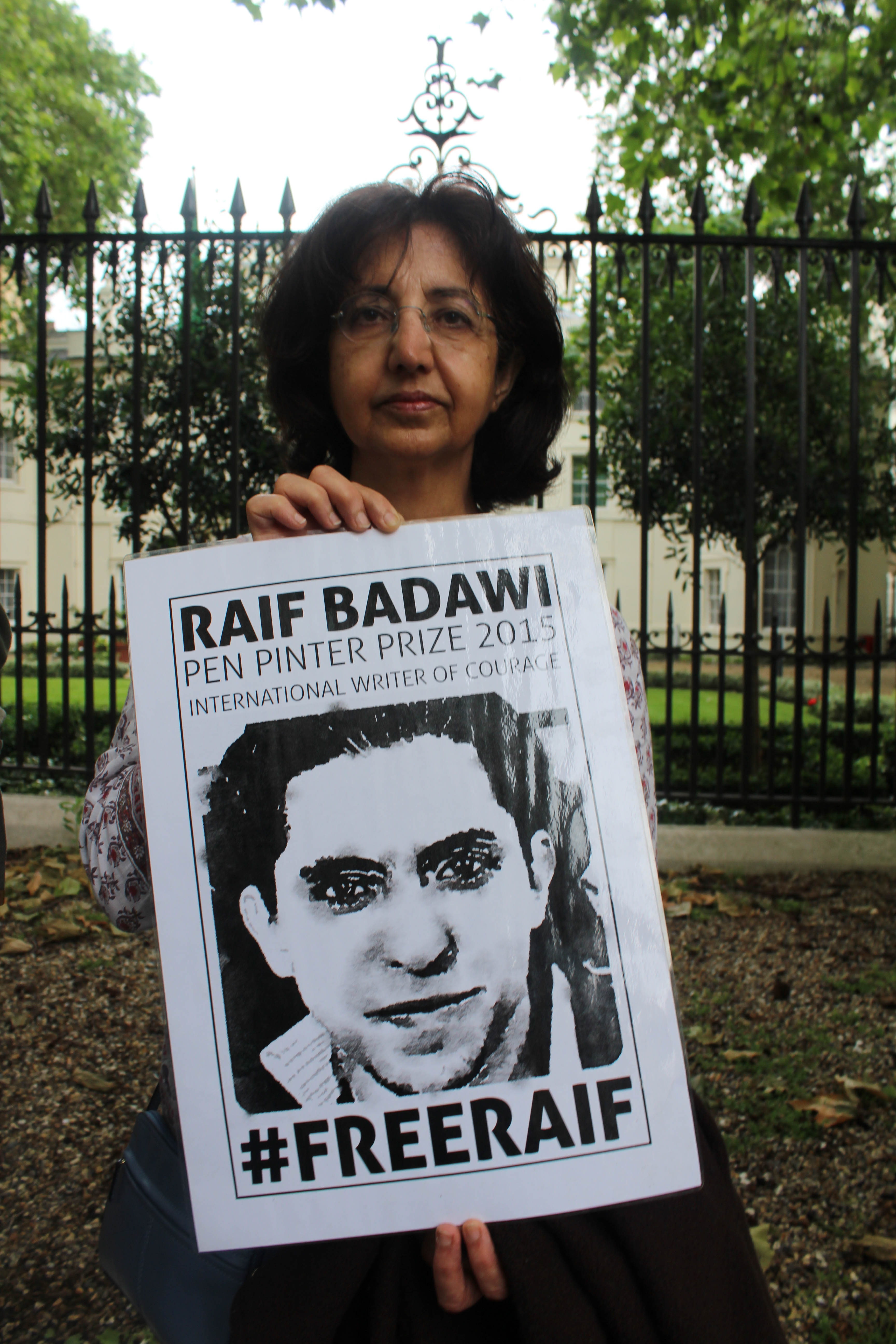
Credit: Cat Lucas, English Pen
Ravinder Randhawa, novelist
“As a writer, I feel that freedom of expression is the most important freedom that humanity has. In all societies, dialogue and discourse are the manners in which we examine ourselves and move forward. Raif was doing precisely that. He was encouraging dialogue and debate which was peaceful and non-harmful, and his punishment is unjustified and barbaric. Raif is a great person for speaking out regardless of the consequences. I’m here to support his cause and the cause of many other writers who are imprisoned. I’m here as a writer in solidarity with another writer.”
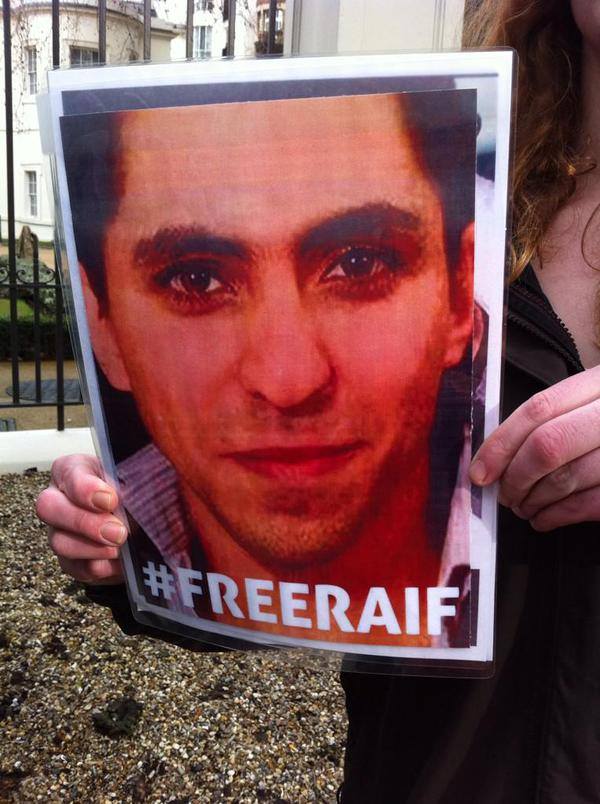
Credit: Cat Lucas, English Pen
Cat Lucas, English Pen
“Unfortunately, here we are outside the Saudi embassy – again. We’ve been coming here for 18 months in support of imprisoned blogger Raif Badawi, firstly with 20 consecutive weekly protests following his lashing, and now we protest here monthly. Today not only marks the fourth anniversary of Raif’s arrest but his lawyer Waleed Abulkhair’s 37th birthday. Waleed is serving a 15-year sentence. We are here to continue to call on the authorities to release them both, which is now more important than ever as we have learned this week that both have been hospitalised following a hunger strike. We know these protests are a really big deal for them.”
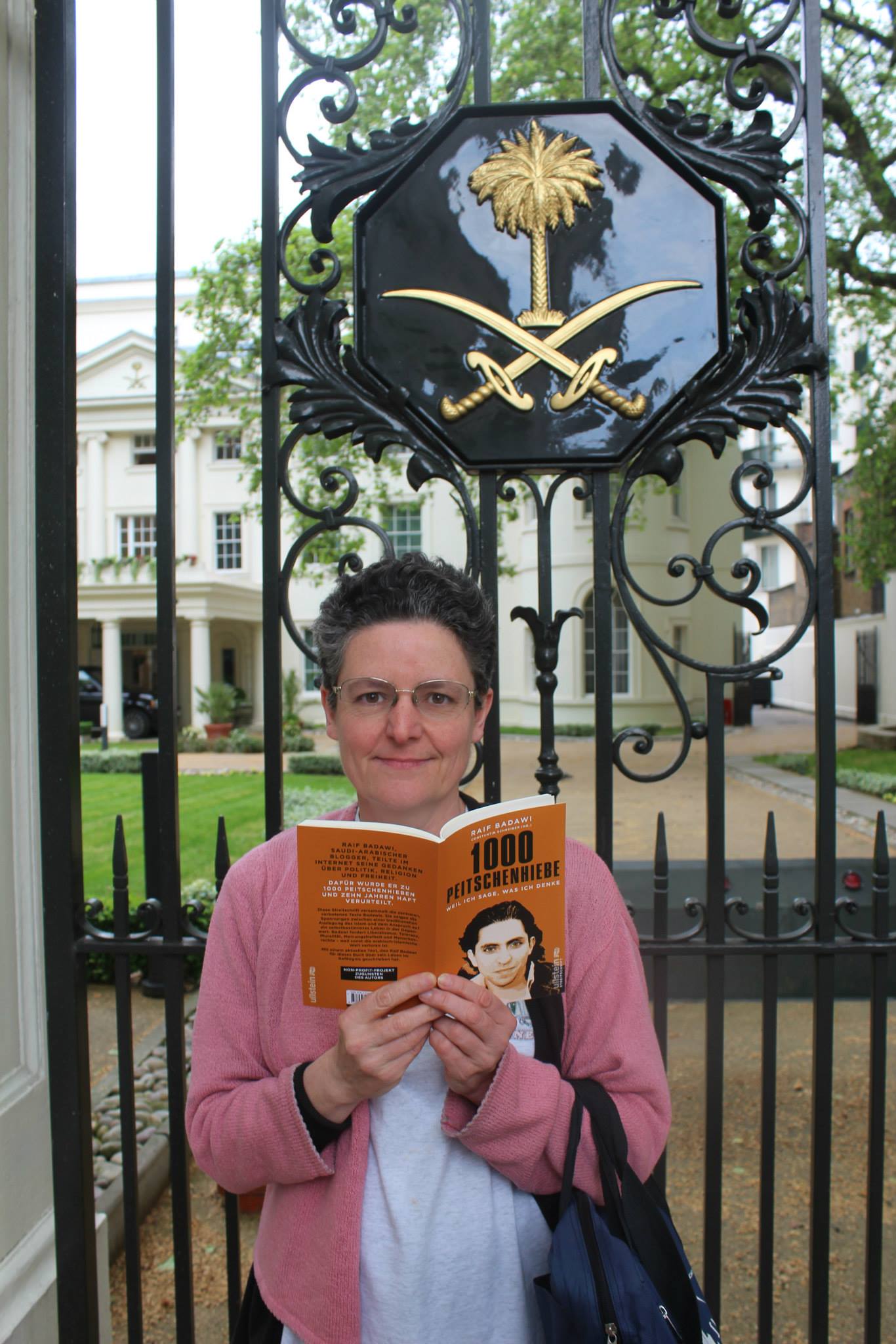
Credit: Cat Lucas, English Pen
Susan Dorrell, Activist
“I come here quite frequently — I’m one of the regulars. It’s very important to stand up for freedom of expression and Raif symbolises thousands of people across the world who suffers persecution as a result of expressing a peaceful opinion. He’s a victim of religious-led persecution and anyone who believes in free speech should support him.”
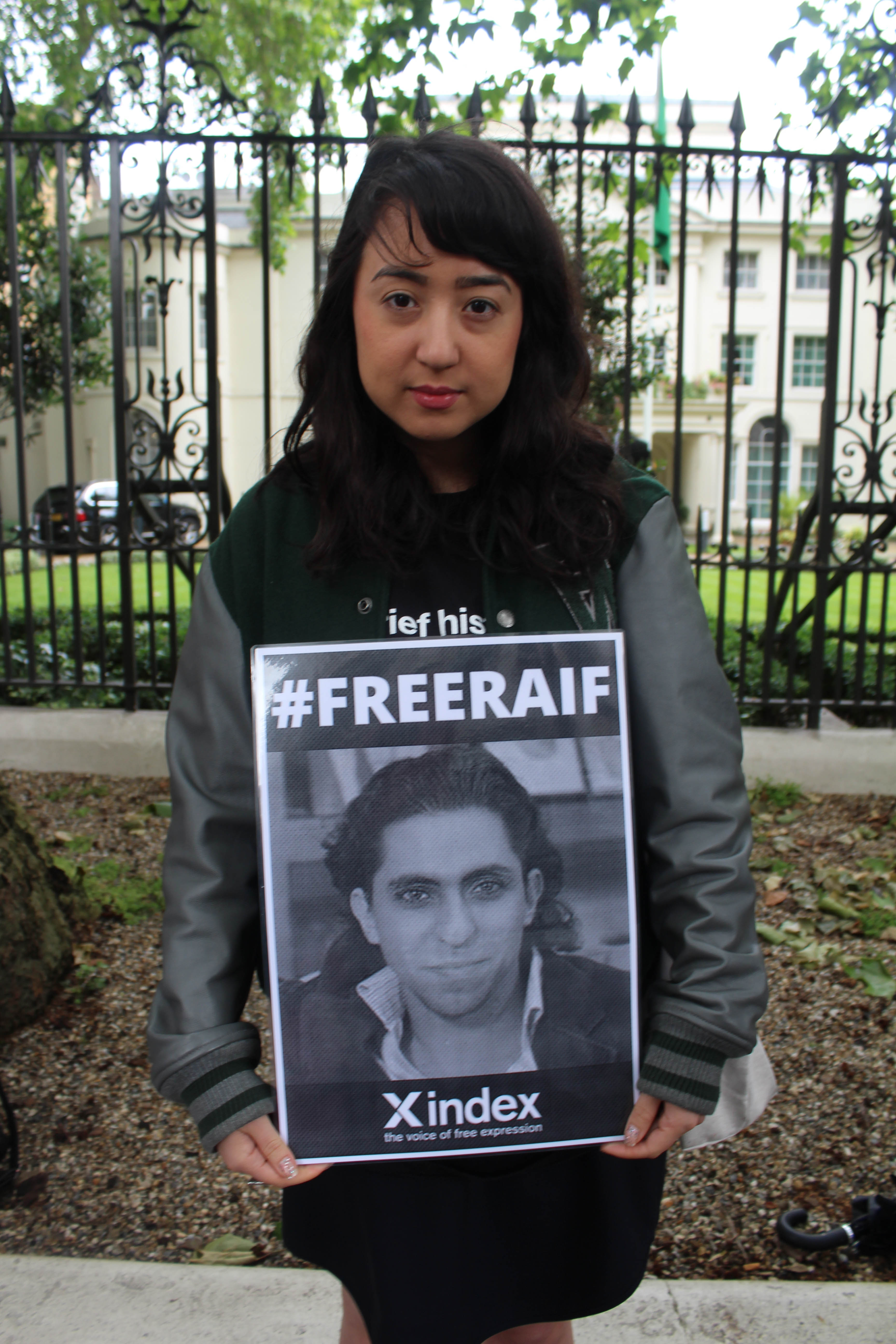
Credit: Cat Lucas, English Pen
Hannah Machlin, Project Officer, Index on Censorship
“We are here in solidarity with Raif. Index on Censorship is particularly concerned with his public lashings, the second set of which has been delayed due to his health problems. If the Saudi government conducts the rest of his lashings in private, as they said they will, there are much more opportunities for abuse. He may not survive and this is why we must not turn a blind eye.”
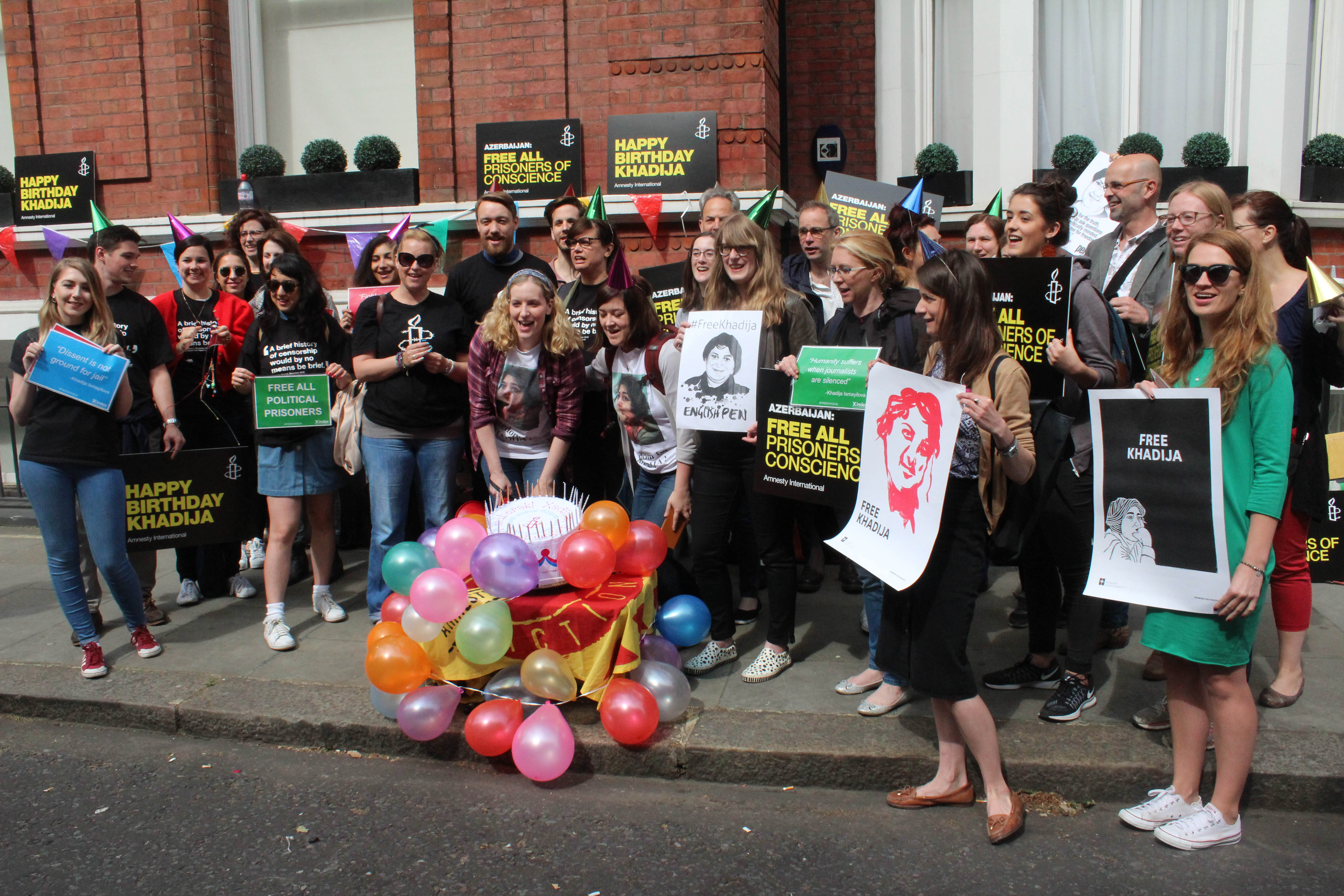
Protest for Khadija Ismayilova, Azerbaijan embassy, London. Credit: Cat Lucas, English Pen
Azerbaijani investigative journalist Khadija Ismayilova may have been released from prison on Wednesday, but two trumped-up charges against her — illegal entrepreneurship and tax evasion –remain. Her seven-and-a-half-year jail sentence has only been reduced to a three-and-a-half-year suspended term and she isn’t free to leave the country.
Today is Ismayilova’s 40th birthday and to mark the occasion, protesters gathered at 40 different demonstrations from around the world, not just to celebrate, but to call for all charges against her to be quashed. Index joined other members of the Sports for Rights coalition at the Azerbaijani embassy in London (see above).
Happy birthday Khadija! pic.twitter.com/FGPlA4Y3xt
— Index on Censorship (@IndexCensorship) May 27, 2016
“Let’s take a moment to celebrate the work that’s been done by this remarkable woman,” Rebecca Vincent, the co-ordinator of the Sport for Rights campaign, told demonstrators.
Currently, around 70 political prisoners — including journalists, bloggers, activists and religious followers — sit in Azerbaijani jails, and Vincent called on protesters to sustain their focus on all of them. “That’s what Khadija has asked for for her birthday,” she said.
Seymur Hezi is an Azerbaijani journalist serving a five-year prison sentence on charges of “aggravated hooliganism”. Hezi, who contributed to the Index on Censorship Freedom of Expression Award-winning newspaper Azadliq, was sentenced on 29 January 2015. He was arrested on 29 August 2014 following an altercation in which the journalist was defending himself from a physical assault and harassment, according to his lawyers. “His case doesn’t get enough international attention, possibly because he is not an English speaker and not well networked,” Vincent said.
Other political prisoners include Ilgar Mammadov, the opposition politician who leads Azerbaijan Republican Alternative Movement, who has been in jail for over three years, and Ilkin Rustemzade, the activistt originally jailed following his Harlem Shake video filmed in Baku.
On the same day Ismayilova was released, two more political prisoners, a youth activist and a journalist, were arrested.
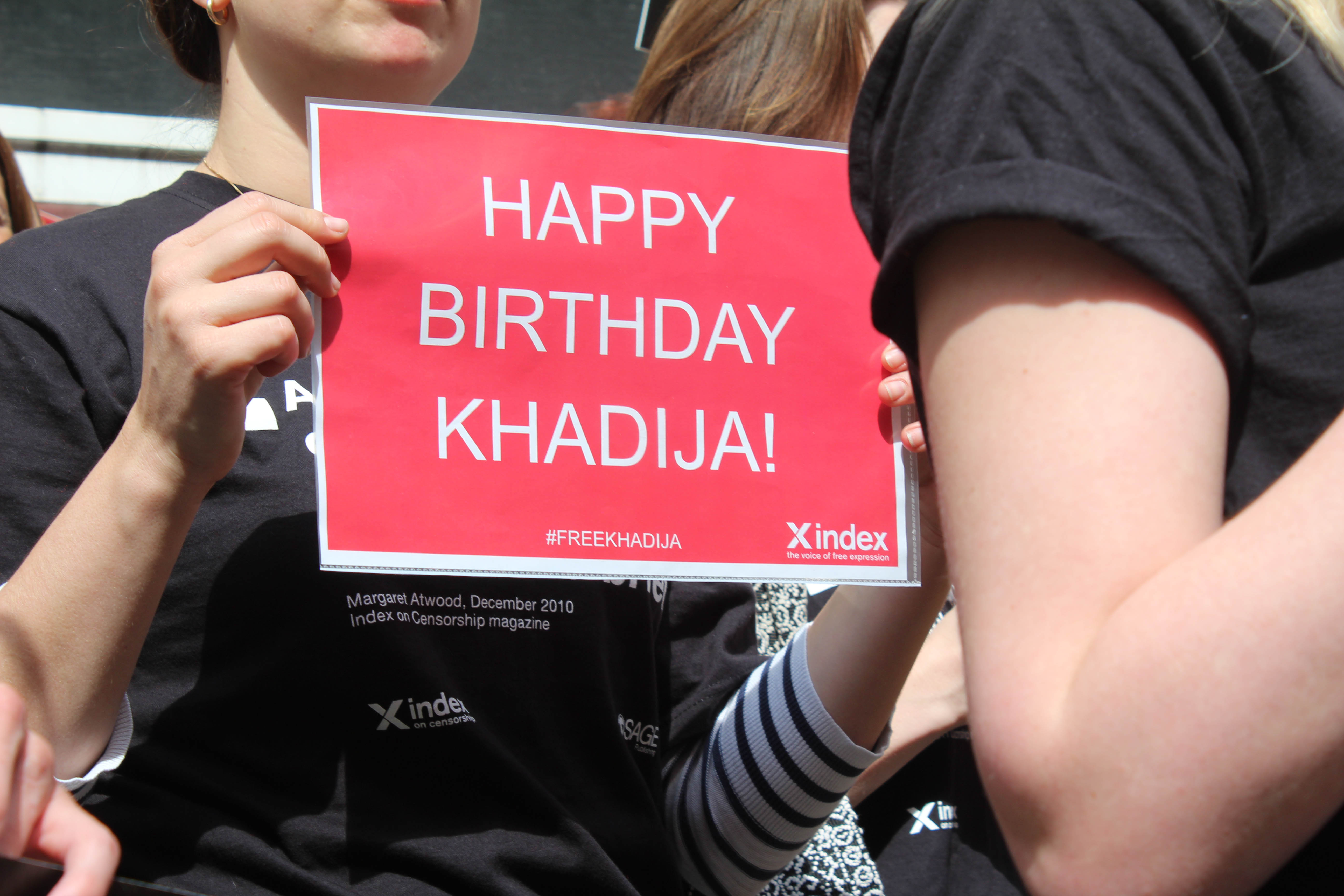
Protest for Khadija Ismayilova, Azerbaijan embassy, London. Credit: Cat Lucas, English Pen
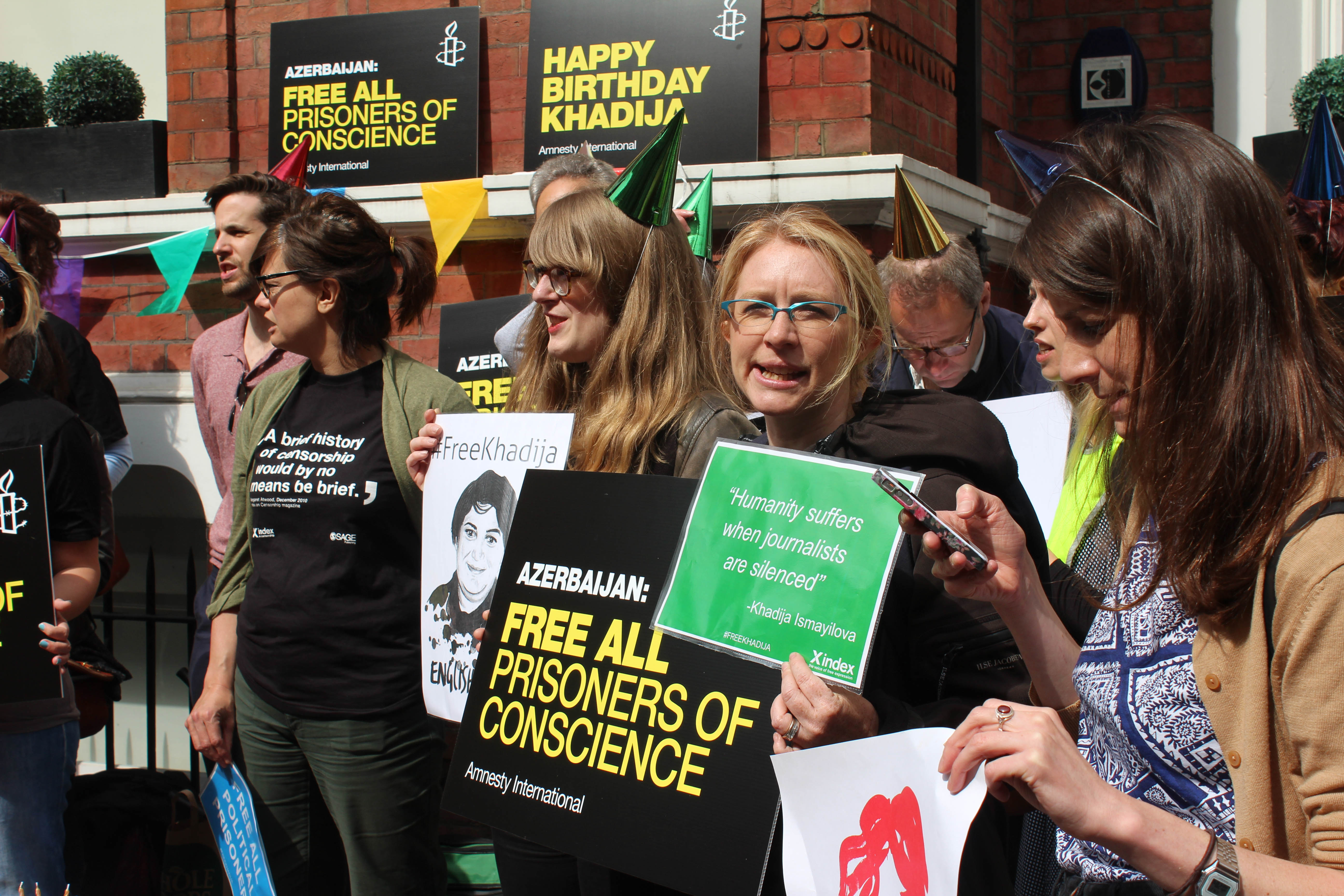
Protest for Khadija Ismayilova, Azerbaijan embassy, London. Credit: Cat Lucas, English Pen
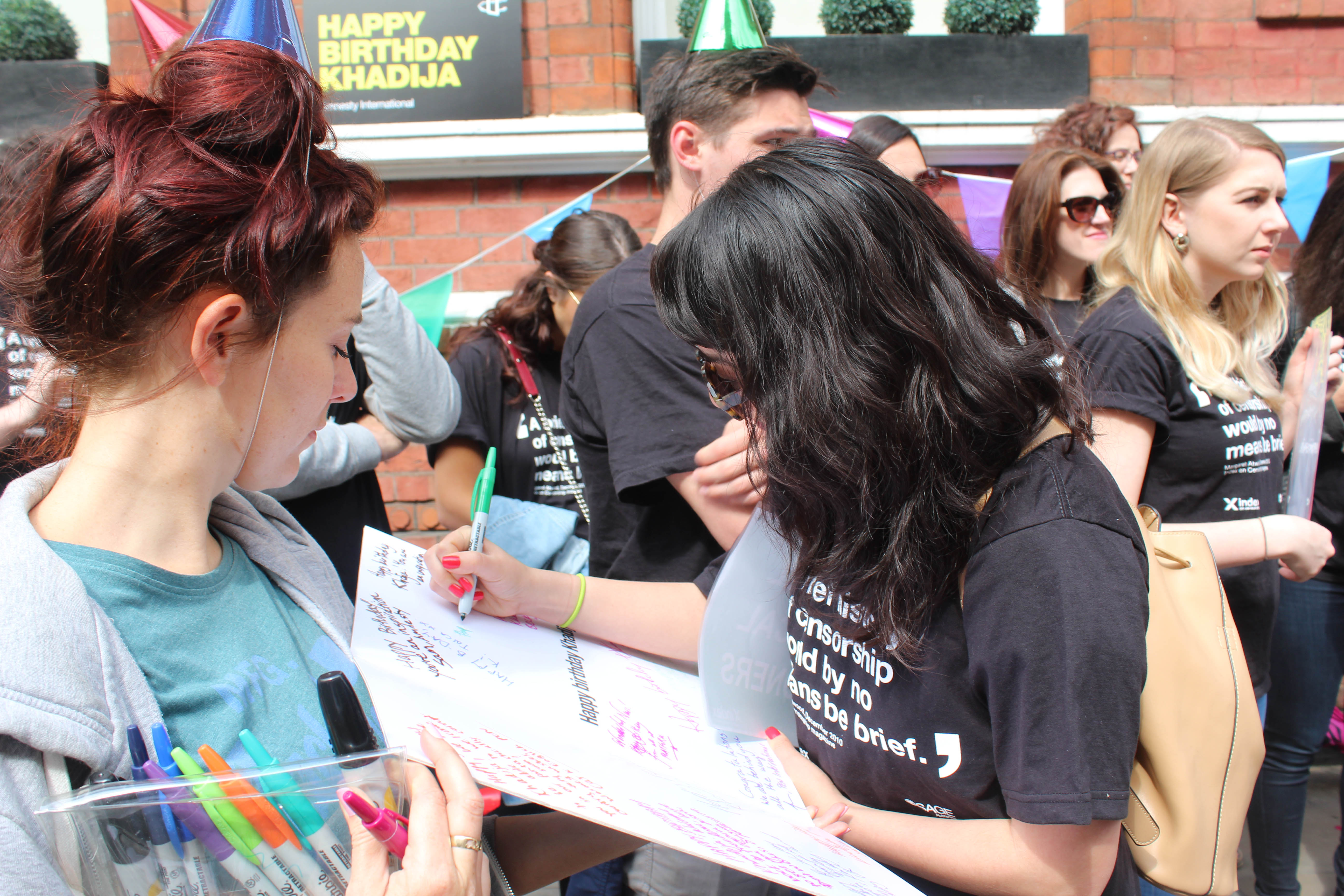
Protest for Khadija Ismayilova, Azerbaijan embassy, London. Credit: Cat Lucas, English Pen
Writing birthday wishes to @khadija_ismayil @melodypatry picks up her pen pic.twitter.com/nNBOsP8h9E
— IndexCensorshipMag (@Index_Magazine) May 27, 2016
Many more protests took place today. Here are some of them:
The #RSF team is celebrating #Khadija‘s birthday in front of the #Azerbaidjan Embassy. Happy bday! https://t.co/h7YEhlEvaV
— RSF (@RSF_inter) May 27, 2016
Thank you @RepMcGovern for joining us to celebrate @Khadija_Ismayil birthday and release! #FreeKhadija pic.twitter.com/sWMaM2z2zw
— Freedom Now (@freedomnoworg) May 26, 2016
Today we celebrate @Khadija_Ismayil but also remember dire #humanrights situation in #Azerbaijan,call #EU for action pic.twitter.com/PYQPLAY1gE
— Alexander Sjödin (@AJSjodin) May 27, 2016
Norwegian journalist Oystein Windstad demands freedom for Seymur Hazi @FrittOrd@SportForRightspic.twitter.com/d4jU6zbvQH
— NHC (@nhc_no) May 27, 2016
The government’s planned Counter-Extremism and Safeguarding Bill must be carefully crafted to avoid damaging freedom of expression.
“The government’s move to counter extremism must not end up silencing us all,” said Jodie Ginsberg, Chief Executive of Index on Censorship. “We should resist any attempts to make it a crime for people of faith to talk publicly about their beliefs, for political parties to voice unpopular views, and for venues from universities to village halls to host anyone whose opinions challenge the status quo. We urge the government to use its consultation to ensure this does not happen.”

The government’s plans to tackle extremism through a “new civil order regime” and other measures must not undermine the very values it aims to defend, free expression organisations said on Wednesday.
Index on Censorship, English PEN, the National Secular Society, the Christian Institute, ARTICLE 19, Big Brother Watch, Manifesto Club and the Peter Tatchell Foundation welcomed plans to consult on the matter, following their demands earlier this year.
The proposals for a new law, outlined in the Queen’s Speech, are more ambiguous than earlier proposals made by this government, but nevertheless leave open broad measures to police a wide swathe of speech and should be resisted, the groups said.
The new legislation will include giving law enforcement agencies new powers to protect vulnerable people – including children – “from those who seek to brainwash them with extremism propaganda so we build a stronger society around our shared liberal values of tolerance and respect”, according to the background notes accompanying the Queen’s Speech.
More specifically, the government proposals are to legislate:
· Stronger powers to disrupt extremists and protect the public.
· Powers to intervene in intensive unregulated education settings which teach hate and drive communities apart.
· A new civil order regime to restrict extremist activity, following consultation.
· Closing loopholes so that Ofcom can continue to protect consumers who watch internet-streamed television content from outside the EU on Freeview.
The new proposals should avoid creating an environment that could make it even harder for people of all faiths and ideologies to express their beliefs and opinions, the groups said. Current legislation already prohibits incitement to violence and terrorism, and a compelling case for broadening them further through civil measures has not been made.
“The government’s move to counter extremism must not end up silencing us all,” said Jodie Ginsberg, Chief Executive of Index on Censorship. “We should resist any attempts to make it a crime for people of faith to talk publicly about their beliefs, for political parties to voice unpopular views, and for venues from universities to village halls to host anyone whose opinions challenge the status quo. We urge the government to use its consultation to ensure this does not happen.”
The groups said plans to introduce new laws in this area presented three main risks:
1. Definitions
It is still not clear how new legislation would deal with the problem of defining “extremism” in a way that would not threaten free speech.
The government has previously defined extremism broadly as “the vocal or active opposition to fundamental British values, including democracy, the rule of law, individual liberty and the mutual respect and tolerance of different faiths and beliefs”. The continued lack of a clear definition risks outlawing any political expression that does not reflect mainstream or popular views.
Britain already has a host of laws to tackle the incitement of terrorist acts, as well as racial and religious hatred. The government has previously been criticised for the broad definitions of “terrorism” in existing legislation, and the definition of ”extremism” in the Prevent Strategy. The proposed bill must not introduce new vague terminology and widen the net even further.
“The government’s approach to extremism is unfocused. Unless we can make them see sense, the range of people who could find themselves labelled ‘extremist’ by their own government is about to get a whole lot wider,” said Simon Calvert of the Christian Institute.
2. Nature of new civil orders
The government is ambiguous on whether they are still considering “extremism disruption orders” or “banning orders” within the package of civil measures. Though the promised consultation is welcome, these draconian measures are clearly not off the table.
Baroness Manningham-Buller, former head of MI5, has said previously that extremists need to be exposed, challenged and countered. The proposed measures would have the opposite effect and should not find their way into the new civil order regime.
“Extremism banning orders could mean political activists – or any other activists deemed to be ‘anti-democratic’ – such as environmental activists – could be outlawed in future, thereby undermining democracy itself,” said Jo Glanville, Director of English PEN.
Extremist disruption orders (EDO), suggested under earlier plans for the bill, could have a similar chilling effect on free expression and democracy. Under original plans for EDOs, the police would be able to apply to the high court for an order to restrict the “harmful activities” of an “extremist” individual. The definition of “harmful” could include a risk of public disorder, a risk of harassment, alarm or distress, or the ill-defined “threat to the functioning of democracy”.
Keith Porteous Wood, Executive Director of the National Secular Society, said: “The prosecution thresholds for EDOs – as originally envisaged – are worryingly low – civil, not criminal – yet the consequences of granting of such an order, even if not broken, are likely to be very serious, e.g. rendering the recipient unemployable. Few faced with such a threat are likely to have the resources to mount any defence as proceedings will be at the High Court.”
“No convincing case has been made for the necessity of new measures to restrict free speech. Existing measures are already deterring individuals and groups from engaging in open debate on important issues. The plans re-announced today, though watered down, do not sufficiently address criticism the government has received; they not only threaten to further chill legitimate speech, but may also fuel divisive ideologies and make us less safe,” said Thomas Hughes, Executive Director of ARTICLE 19.
3. International implications
Governments across the world – such as Russia, Turkey and Egypt – are increasingly using national security laws to censor free expression, including in the media. The government’s moves are likely to legitimise and embolden these efforts, setting a counter-productive example.
UN and regional human rights experts have jointly raised concerns regarding the potential impact of broadly defined initiatives to counter violent extremism on the free expression of minority and dissenting views. They have called for responses to violent extremism to be evidence based, and to respect international human rights law on freedom of expression and non-discrimination.
Conclusion
We call on the government to consult widely with all stakeholders, including civil society and minority groups, to ensure that a bill intended to tackle extremism does not undermine one of the values at the heart of democracy: that of free speech for all.
For more information or to arrange interviews, please contact:
– Melody Patry, head of advocacy, Index on Censorship.
[email protected]; 0207 963 7262
– Robert Sharp, head of communications, English PEN
[email protected]; 020 7324 2535